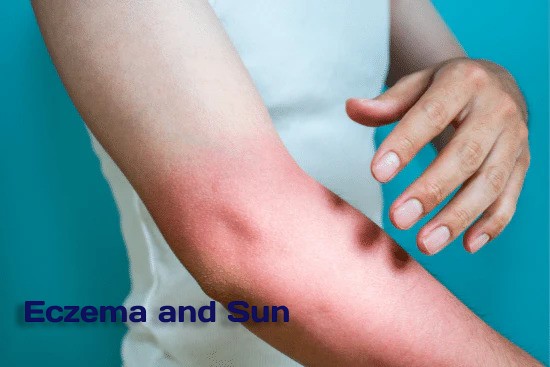
Introduction
Eczema, a common skin condition, can feel like an uphill battle. From the relentless itching to the visible flare-ups, managing eczema requires understanding its triggers and treatments. Surprisingly, one of the simplest remedies—sunlight—can be both a friend and foe to your skin. So, can sunlight help eczema, or does it cause more harm? Let’s dive into the science and practicalities of this intriguing connection.
Understanding Eczema
What is Eczema?
Eczema, or atopic dermatitis, is a chronic skin condition characterized by inflammation, redness, and intense itching. It often appears in patches on the face, neck, hands, and behind the knees. While it’s not contagious, eczema can significantly impact your quality of life.
Causes of Eczema
The exact cause of eczema remains a mystery, but it’s often linked to genetic factors and environmental triggers. If you have a family history of eczema or other allergic conditions like asthma, your chances of developing it are higher. Environmental factors like allergens, harsh soaps, and weather changes can also play a role.
Eczema’s Impact on Daily Life
Beyond physical discomfort, eczema can take a toll emotionally. Visible flare-ups may lead to self-consciousness, and the constant itching can disrupt sleep and daily activities.
Sunlight and Skin Health
The Benefits of Sunlight
Sunlight plays a crucial role in our health. It stimulates vitamin D production, which is essential for bone health and immune function. Additionally, sunlight has antimicrobial properties that can benefit skin prone to infections.
Risks of Sunlight Exposure
However, sunlight isn’t without risks. Overexposure can lead to UV damage, causing premature aging and increasing the risk of skin cancer. For people with eczema, sunburns can aggravate symptoms and further weaken the skin barrier.
Can Sunlight Help Eczema?
Positive Effects of Sunlight on Eczema
Research suggests that moderate sunlight exposure can reduce eczema symptoms. Sunlight helps by reducing inflammation and encouraging the production of beneficial chemicals in the skin. It also improves the skin barrier, making it more resilient to environmental irritants.
Limitations of Sunlight Therapy
Despite its benefits, sunlight therapy isn’t a one-size-fits-all solution. Seasonal restrictions in colder climates and the risk of overexposure mean that relying solely on sunlight is impractical for many.
Can Sunlight Harm Eczema?
Overexposure to Sunlight
Too much of a good thing can be harmful. Prolonged exposure can cause sunburns, which weaken the already delicate skin of eczema sufferers. Additionally, heat and sweat from being in the sun can act as triggers, leading to flare-ups.
Photodermatitis and Eczema
Some individuals with eczema may develop photodermatitis, a condition where their skin becomes overly sensitive to sunlight. This reaction can worsen eczema symptoms, making sunlight a less viable option.
Best Practices for Using Sunlight to Help Eczema
Timing Matters
The best time for sunlight exposure is during the early morning or late afternoon when UV levels are lower. This reduces the risk of sunburn while still reaping the benefits.
Duration of Exposure
Limit your exposure to 10–20 minutes daily. This is typically enough to gain the benefits of sunlight without overexposing your skin.
Protection During Sunlight Exposure
Always use sunscreen that is suitable for sensitive skin. Look for one labeled hypoallergenic and fragrance-free to avoid irritation.
Other Treatments for Eczema
Skincare Routine
A consistent skincare routine is key to managing eczema. Use a fragrance-free cream to keep your skin hydrated and protected from irritants.
Medical Treatments
For more severe cases, topical steroids or prescription medications may be necessary. Phototherapy, a controlled form of UV light exposure, is another option that has shown promise.
Lifestyle Adjustments
Stress and diet can influence eczema. Incorporating relaxation techniques and an anti-inflammatory diet can complement other treatments.
When to Seek Professional Help
Signs You Need a Doctor
If your eczema doesn’t improve with over-the-counter treatments or if you experience severe pain, cracking, or signs of infection, it’s time to consult a dermatologist.
Conclusion
Sunlight can both help and harm eczema, depending on how you use it. While moderate exposure can reduce inflammation and strengthen your skin, overexposure can lead to sunburns and flare-ups. By striking a balance and using protective measures, you can harness sunlight’s benefits without the downsides. Remember, managing eczema is a journey, and sunlight is just one piece of the puzzle.
FAQs
- Can sunlight completely cure eczema?
No, sunlight can help manage symptoms but is not a cure for eczema. - How long should I stay in the sun for eczema relief?
10–20 minutes of sunlight exposure daily is typically sufficient. - Is sunscreen safe for eczema-prone skin?
Yes, choose a hypoallergenic, fragrance-free sunscreen to avoid irritation. - Are there alternatives to sunlight for vitamin D?
Yes, you can get vitamin D from supplements or certain foods like fatty fish and fortified dairy products.
5. What’s the best time of day for sunlight exposure?
Early morning or late afternoon is ideal to minimize UV damage.





Leave a Reply